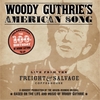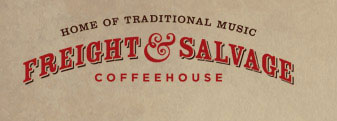In July 2014 the Freight brought back a concert production of Woody Guthrie’s American Song, the award-winning musical based on the life and music of the iconic American folk singer, written and directed by Peter Glazer. The veteran cast seamlessly melds Guthrie’s jokes, tales, & music— classics like “Bound for Glory” and “This Land Is Your Land,” as well as lesser-known treasures like “Jolly Banker” and “Ludlow Massacre”— for a show The New York Times said "manages to find both the high beauty and the earthly humor of Guthrie's love affair with America."





Reprising their roles from the 2012 production, the cast of musician/actors features Lisa Asher, Berwick Haynes, Sam Misner, Matt Mueller, and Megan Smith. The house band includes long-time Freight regulars Chuck Ervin, Robin Flower, Tony Marcus, and Harry Yaglijian, as well as Musical Director Jeff Waxman.





The encore presentation coincides with the release of Live From The Freight & Salvage—Woody Guthrie's American Song, recorded during the sold-out run in July 2012, marking Woody Guthrie's hundredth birthday. Writer and director Peter Glazer says, "When we all gathered in the beautiful Freight concert hall with its great acoustics and supreme sound system–the show exploded from the stage. It was a rare occasion, and I didn't want to let it slip through my fingers."

A Voice of the People
by Felicia Hardison Londré
Like Thomas Hart Benton's paintings and John Steinbeck's novels, Woody Guthrie's songs celebrated "common man." In the 1930s and 40s, all three contributed to a populistic surge of Americana in the arts, combining folklore and hard-edged realism. Of the three, Guthrie most directly experienced the hardships endured with dignity by a vast cross-section of American people from the Oklahoma Dust Bowl to the migrant worker camps of California to New York's skid row. Indeed, he was one of the 500,000 "Okies" who made their way to California in the early 1930s-like the Joad family in Steinbeck's The Grapes of Wrath, which later inspired his "Ballad of Tom Joad."
Woodrow Wilson Guthrie (1912-1967) was born in Okemah, Oklahoma, a tiny railroad village that burgeoned during the oil boom of 1920-26 and was ravaged by the great dust storm of April1935. His father's failure in local politics and his mother's undiagnosed Huntington's chorea (an incurable degeneration of the nervous system) made Guthrie's home life so difficult from the time he was twelve years old that he would often spend several days away from the family. His mother was put in the state mental hospital when he was fourteen; when she died his father took a mail-order bride who turned out to be a practitioner of voodoo and various other mystic rites. After Guthrie left Oklahoma in 1936, he rarely stopped travelling for the rest of his life. "If the chronology becomes fuzzy," reminisced one acquaintance, "that's because Woody could say he was going to the corner for a pack of cigarettes and write from the West Coast three weeks later."
In his collection of short essays Born to Win, Guthrie summarized his experience: "I've been frozen stiff a few times along the sides of roads, been chased by the clubs and guns of sheriff and deputy, been on top of fast freights in lightning storms and thunderstorms, been in cyclones and floods, been through a dozen deadly droughts and dust storms, and been through every kind of fear and discouragement there is, and been through the mills of marriage more times than just one. I’ve been bankrupted a few thousand times and wasted lots of time and money, but I never did feel guilty about any of this because I was torpedoed two times in the merchant marine during the war and I figure that whatever guilty feeling I owed to the race I paid off by these two torpedoes, and I paid off some more by laying out eight months in the army with a uniform on."
Woody Guthrie's American Song does not attempt to present the complex biography of the man who wrote over 1,000 original songs and did more than any other single musician to launch a tradition of American folk music. The geo graphical and social landscape of Guthrie's songs is a rich enough field for the show to explore without going into his three marriages and divorces, his personal tragedies, his radio programs, his flirtation with Communism, his Library of Congress recordings of his Dust Bowl Ballads (1940),or his fifteen-year hospitalization for Huntington's disease. Peter Glazer has chosen rather to offer a selection of themes that the poet-philosopher articulated in his written works—including Bound for Glory, Seeds of Man, and Woody Sez—as well as his cartoon drawings and his music: travelling a hard road, the quest for meaning, the dignity of work, the basic goodness of people, and the place of song in people’s lives.
Recognition of Woody Guthrie's significant contribution to our American cultural heritage finally began to occur in 1956, soon after his career was cut short by the inherited disease. Subsequent decades have confirmed Clifton Fadiman's 1943 prediction in The New Yorker: "Some day people are going to wake up to the fact that Woody Guthrie and the ten thousand songs that leap and tumble off the strings of his music box are a national possession, like Yellowstone or Yosemite, and part of the best stuff this country has to show the world."
(Reprinted by permission of the author; originally published by Missouri Repertory Theatre in their program for Woody Guthrie's American Song.)

Woody Guthrie's American Song is supported in part through the generosity of Credo Mobile











